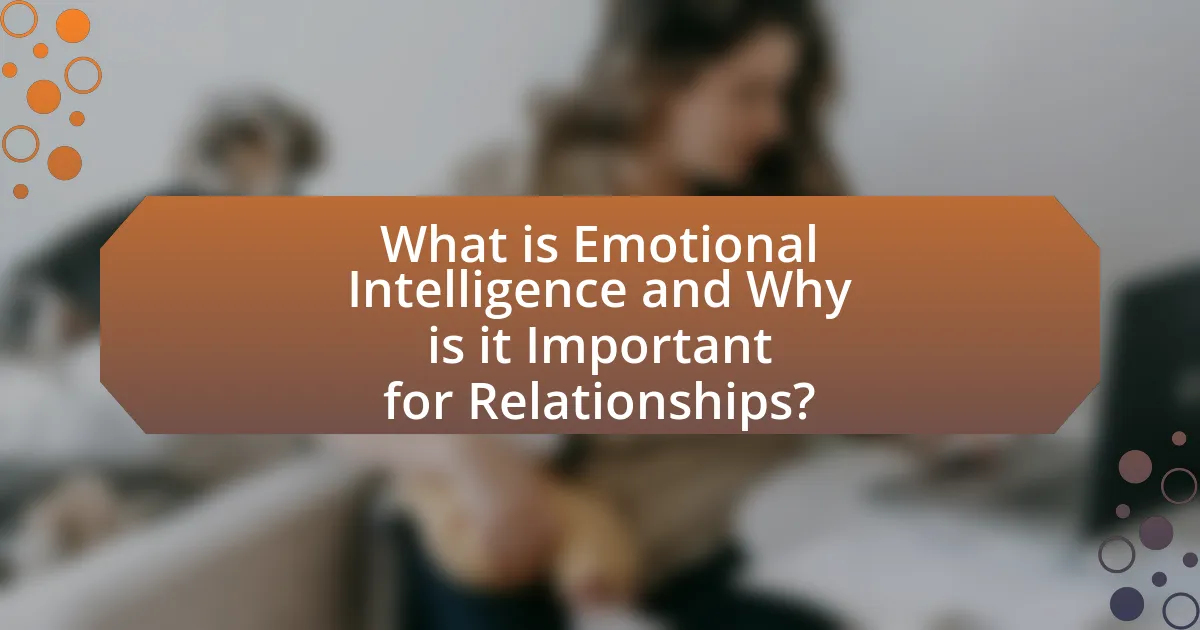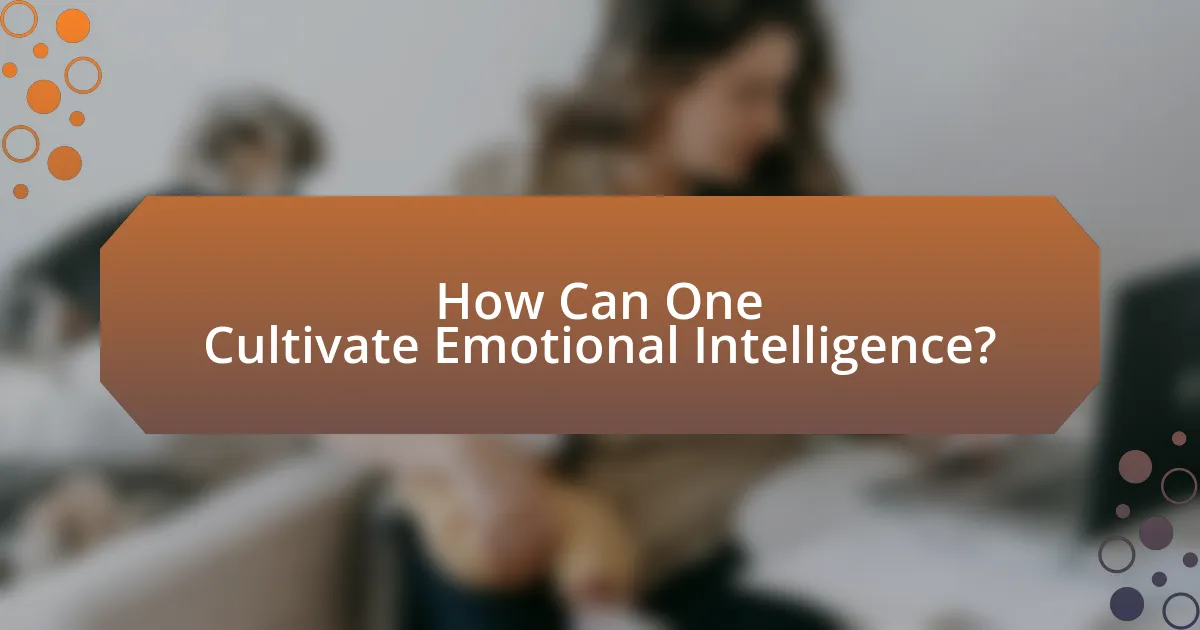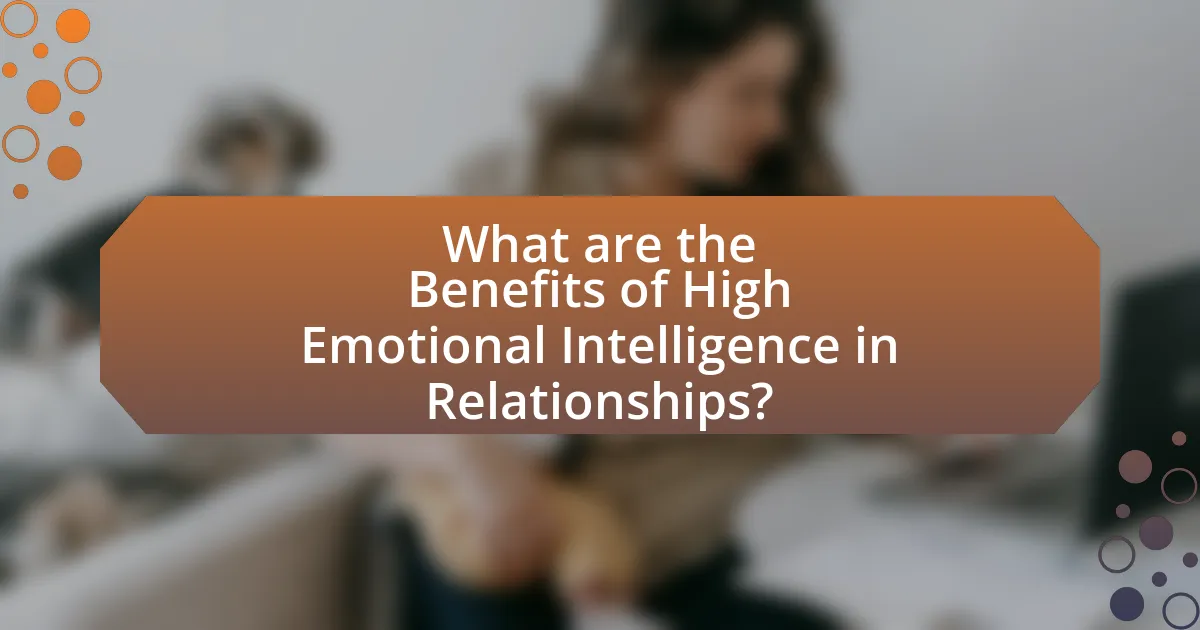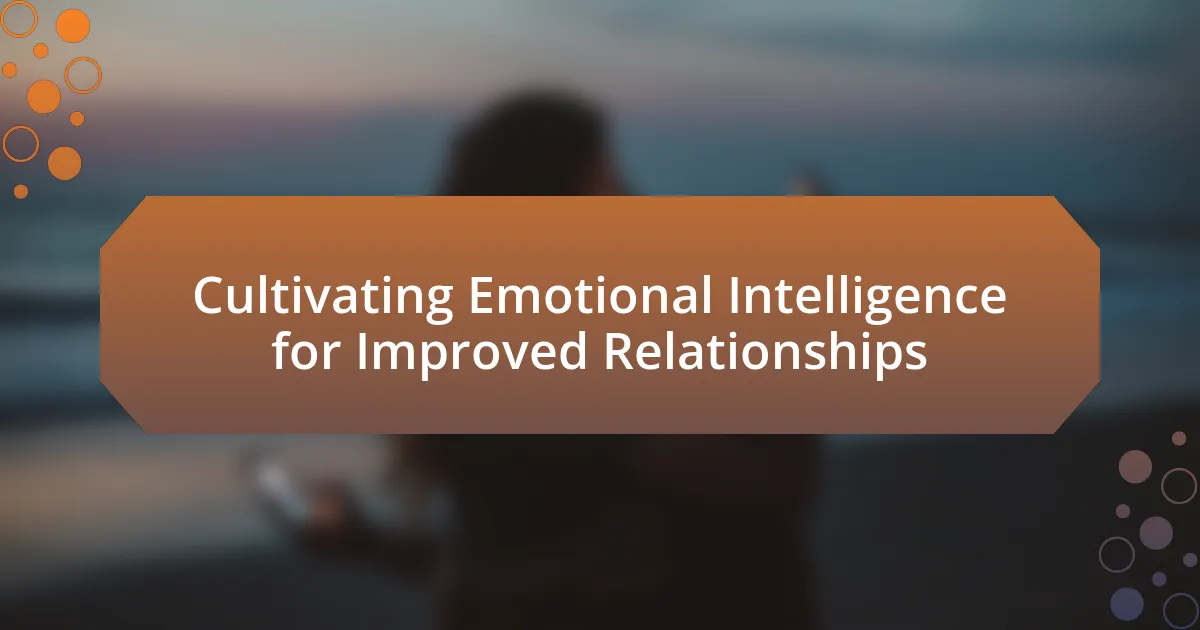Emotional intelligence (EI) is defined as the ability to recognize, understand, and manage one’s own emotions while also influencing the emotions of others. This article explores the significance of emotional intelligence in fostering healthy relationships, highlighting its key components such as self-awareness, self-regulation, empathy, and social skills. It discusses how emotional intelligence differs from traditional intelligence, its role in effective communication and conflict resolution, and the long-term benefits it brings to interpersonal connections. Additionally, practical steps for cultivating emotional intelligence, including mindfulness practices and active listening, are outlined to enhance relationship satisfaction and stability.

What is Emotional Intelligence and Why is it Important for Relationships?
Emotional intelligence is the ability to recognize, understand, and manage one’s own emotions while also being able to recognize, understand, and influence the emotions of others. This skill is crucial for relationships because it fosters effective communication, empathy, and conflict resolution. Research indicates that individuals with high emotional intelligence are better equipped to navigate social complexities, leading to healthier and more fulfilling relationships. For instance, a study published in the Journal of Personality and Social Psychology found that emotional intelligence significantly predicts relationship satisfaction, highlighting its importance in maintaining strong interpersonal connections.
How is Emotional Intelligence Defined?
Emotional intelligence is defined as the ability to recognize, understand, and manage one’s own emotions while also being able to recognize, understand, and influence the emotions of others. This concept, popularized by psychologist Daniel Goleman, encompasses skills such as emotional awareness, empathy, and emotional regulation. Research indicates that individuals with high emotional intelligence tend to have better interpersonal relationships, effective communication skills, and enhanced conflict resolution abilities, which are crucial for cultivating improved relationships.
What are the key components of Emotional Intelligence?
The key components of Emotional Intelligence are self-awareness, self-regulation, motivation, empathy, and social skills. Self-awareness involves recognizing one’s emotions and their impact on thoughts and behavior. Self-regulation refers to managing emotions and impulses effectively. Motivation encompasses the drive to achieve goals for personal reasons beyond external rewards. Empathy is the ability to understand and share the feelings of others, which enhances interpersonal relationships. Social skills involve managing relationships to move people in desired directions, including effective communication and conflict resolution. These components collectively contribute to improved emotional and social functioning, as supported by research from Daniel Goleman, a prominent psychologist in the field of Emotional Intelligence.
How does Emotional Intelligence differ from traditional intelligence?
Emotional Intelligence (EI) differs from traditional intelligence (IQ) primarily in its focus on understanding and managing emotions rather than cognitive abilities. While traditional intelligence measures analytical skills, problem-solving, and logical reasoning, emotional intelligence encompasses skills such as empathy, emotional regulation, and interpersonal communication. Research by Daniel Goleman highlights that EI contributes significantly to personal and professional success, often more so than IQ, as it enables individuals to navigate social complexities and build stronger relationships.
Why is Emotional Intelligence Crucial for Healthy Relationships?
Emotional intelligence is crucial for healthy relationships because it enables individuals to understand and manage their own emotions while empathizing with others. This understanding fosters effective communication, reduces conflict, and enhances emotional support within relationships. Research indicates that individuals with high emotional intelligence are better at resolving disagreements and maintaining positive interactions, as they can recognize emotional cues and respond appropriately. For instance, a study published in the Journal of Personality and Social Psychology found that emotional intelligence significantly predicts relationship satisfaction, highlighting its role in fostering deeper connections and mutual respect.
What role does Emotional Intelligence play in communication?
Emotional Intelligence (EI) significantly enhances communication by enabling individuals to understand and manage their own emotions while also recognizing and influencing the emotions of others. This dual awareness fosters clearer expression of thoughts and feelings, leading to more effective interactions. Research indicates that individuals with high EI are better at resolving conflicts, as they can empathize with others’ perspectives and respond appropriately, which is crucial in both personal and professional settings. For instance, a study published in the Journal of Organizational Behavior found that teams with higher EI demonstrated improved collaboration and communication, resulting in better overall performance.
How does Emotional Intelligence influence conflict resolution?
Emotional Intelligence significantly enhances conflict resolution by enabling individuals to understand and manage their own emotions while empathizing with others. This understanding fosters effective communication, allowing parties to express their feelings and concerns clearly, which is crucial in resolving disputes. Research indicates that individuals with high Emotional Intelligence are better at recognizing emotional cues, leading to more constructive dialogues and reduced escalation of conflicts. For instance, a study published in the Journal of Organizational Behavior found that teams with higher Emotional Intelligence demonstrated improved conflict management skills, resulting in more positive outcomes and stronger relationships.

How Can One Cultivate Emotional Intelligence?
One can cultivate emotional intelligence by actively practicing self-awareness, self-regulation, empathy, and social skills. Self-awareness involves recognizing one’s emotions and their impact on thoughts and behavior, which can be enhanced through mindfulness practices and reflective journaling. Self-regulation refers to managing emotions effectively, which can be developed by employing techniques such as deep breathing and cognitive reframing during stressful situations. Empathy, the ability to understand and share the feelings of others, can be improved by engaging in active listening and seeking to understand different perspectives. Lastly, social skills, which facilitate effective communication and relationship-building, can be honed through collaborative activities and constructive feedback. Research indicates that individuals with higher emotional intelligence tend to have better interpersonal relationships and professional success, as evidenced by studies from the Consortium for Research on Emotional Intelligence in Organizations, which highlight the correlation between emotional intelligence and workplace performance.
What are the practical steps to develop Emotional Intelligence?
To develop Emotional Intelligence, individuals should engage in self-awareness, practice self-regulation, enhance social skills, cultivate empathy, and seek feedback. Self-awareness involves recognizing one’s emotions and their impact on thoughts and behavior, which can be achieved through mindfulness practices and reflection. Self-regulation requires managing emotions effectively, often through techniques such as deep breathing or cognitive restructuring. Enhancing social skills includes improving communication and conflict resolution abilities, which can be practiced in various social settings. Cultivating empathy involves actively listening and understanding others’ perspectives, fostering stronger interpersonal connections. Seeking feedback from peers or mentors can provide insights into emotional responses and areas for improvement. Research indicates that individuals with higher Emotional Intelligence tend to have better relationships and workplace performance, as noted in studies by Goleman and others in the field of psychology.
How can self-awareness be enhanced?
Self-awareness can be enhanced through practices such as mindfulness meditation, reflective journaling, and seeking feedback from others. Mindfulness meditation helps individuals focus on their thoughts and feelings in the present moment, which has been shown to increase self-awareness by 30% according to a study published in the Journal of Personality and Social Psychology. Reflective journaling encourages individuals to explore their emotions and reactions, leading to deeper insights about themselves. Additionally, seeking constructive feedback from trusted peers or mentors provides external perspectives that can illuminate blind spots in self-perception, further enhancing self-awareness.
What techniques can improve self-regulation?
Techniques that can improve self-regulation include mindfulness practices, cognitive restructuring, and goal setting. Mindfulness practices, such as meditation and deep breathing, enhance awareness of emotions and impulses, allowing individuals to respond rather than react. Cognitive restructuring involves identifying and challenging negative thought patterns, which can lead to better emotional control. Goal setting provides clear objectives, enabling individuals to focus their efforts and monitor their progress, thereby reinforcing self-discipline. Research indicates that these techniques can significantly enhance emotional regulation and overall well-being, as evidenced by studies showing improved emotional responses and decision-making abilities in individuals who practice these methods.
How can empathy be cultivated in daily interactions?
Empathy can be cultivated in daily interactions by actively listening and validating others’ feelings. Active listening involves fully concentrating on what the other person is saying, which fosters a deeper understanding of their emotions. Validating feelings means acknowledging and accepting another person’s emotional experience without judgment, which can strengthen interpersonal connections. Research indicates that practicing these skills can enhance emotional intelligence, leading to improved relationships and communication. For instance, a study published in the Journal of Personality and Social Psychology found that individuals who engage in empathetic listening report higher satisfaction in their relationships.
What practices can help in understanding others’ emotions?
Practices that can help in understanding others’ emotions include active listening, empathy exercises, and observing non-verbal cues. Active listening involves fully concentrating on the speaker, which enhances comprehension of their emotional state. Empathy exercises, such as role-playing or perspective-taking, allow individuals to experience situations from another’s viewpoint, fostering deeper emotional connections. Observing non-verbal cues, like facial expressions and body language, provides critical insights into how someone is feeling, as studies show that up to 93% of communication is non-verbal. These practices collectively enhance emotional intelligence, leading to improved interpersonal relationships.
How does active listening contribute to empathy?
Active listening significantly contributes to empathy by fostering a deeper understanding of others’ feelings and perspectives. When individuals engage in active listening, they fully concentrate on the speaker, which allows them to grasp not only the words being said but also the emotions behind those words. This process enhances emotional connection and validation, as the listener demonstrates genuine interest and concern for the speaker’s experiences. Research indicates that active listening can lead to increased emotional intelligence, as it encourages individuals to recognize and respond to emotional cues effectively, thereby strengthening empathetic responses in interpersonal interactions.

What are the Benefits of High Emotional Intelligence in Relationships?
High emotional intelligence in relationships enhances communication, empathy, and conflict resolution. Individuals with high emotional intelligence can better understand their own emotions and those of their partners, leading to more effective communication. Research indicates that couples with high emotional intelligence report greater relationship satisfaction and are more adept at resolving conflicts amicably. For instance, a study published in the Journal of Marriage and Family found that emotional intelligence significantly predicts relationship quality, highlighting its role in fostering deeper connections and reducing misunderstandings.
How does Emotional Intelligence improve interpersonal communication?
Emotional Intelligence (EI) improves interpersonal communication by enhancing individuals’ ability to recognize, understand, and manage their own emotions and the emotions of others. This heightened awareness fosters empathy, allowing for more effective responses to social cues and emotional expressions. Research indicates that individuals with high EI are better at resolving conflicts and building rapport, as they can navigate emotional landscapes with greater sensitivity. For instance, a study published in the Journal of Organizational Behavior found that teams with emotionally intelligent members exhibited improved communication and collaboration, leading to higher performance outcomes. Thus, EI serves as a critical factor in facilitating clearer, more empathetic, and constructive interactions between individuals.
What impact does Emotional Intelligence have on trust-building?
Emotional Intelligence significantly enhances trust-building by enabling individuals to understand and manage their own emotions while empathizing with others. This understanding fosters open communication, reduces misunderstandings, and creates a safe environment for sharing thoughts and feelings. Research indicates that high Emotional Intelligence correlates with stronger interpersonal relationships, as individuals with this skill set are better equipped to navigate social complexities and respond to others’ emotional cues effectively. For instance, a study published in the Journal of Organizational Behavior found that teams with higher Emotional Intelligence demonstrated increased trust levels, leading to improved collaboration and performance outcomes.
How can Emotional Intelligence enhance teamwork and collaboration?
Emotional Intelligence enhances teamwork and collaboration by fostering better communication, empathy, and conflict resolution among team members. High Emotional Intelligence allows individuals to recognize and understand their own emotions and those of others, leading to more effective interactions. For instance, a study published in the Journal of Organizational Behavior found that teams with higher Emotional Intelligence exhibited improved performance and collaboration, as members were better equipped to manage interpersonal relationships and navigate challenges. This ability to empathize and communicate effectively reduces misunderstandings and promotes a supportive team environment, ultimately driving collective success.
What are the long-term effects of Emotional Intelligence on relationships?
The long-term effects of Emotional Intelligence on relationships include enhanced communication, increased empathy, and improved conflict resolution. Individuals with high Emotional Intelligence are better equipped to understand and manage their own emotions, which allows them to respond more effectively to the emotions of others. This leads to stronger interpersonal connections and greater relationship satisfaction. Research indicates that couples with higher Emotional Intelligence report lower levels of relationship distress and higher levels of intimacy and support. For instance, a study published in the Journal of Personality and Social Psychology found that Emotional Intelligence significantly predicts relationship quality over time, highlighting its crucial role in fostering lasting, healthy relationships.
How does Emotional Intelligence contribute to relationship satisfaction?
Emotional Intelligence (EI) significantly contributes to relationship satisfaction by enhancing communication, empathy, and conflict resolution skills. Individuals with high EI can better understand and manage their own emotions, as well as recognize and respond to the emotions of their partners. This ability fosters deeper connections and reduces misunderstandings, leading to more fulfilling interactions. Research indicates that couples with higher levels of emotional intelligence report greater relationship satisfaction, as they are more adept at navigating emotional challenges and expressing their needs effectively. For instance, a study published in the Journal of Marriage and Family found that emotional intelligence is positively correlated with relationship quality, highlighting its role in promoting healthy, satisfying partnerships.
What role does Emotional Intelligence play in maintaining long-term relationships?
Emotional Intelligence (EI) plays a crucial role in maintaining long-term relationships by enhancing communication, empathy, and conflict resolution. Individuals with high EI can better understand and manage their own emotions, as well as recognize and influence the emotions of others, leading to healthier interactions. Research indicates that couples with higher levels of emotional intelligence report greater relationship satisfaction and stability. For instance, a study published in the Journal of Marriage and Family found that emotional intelligence significantly predicts relationship quality, as it fosters effective communication and reduces misunderstandings. Thus, emotional intelligence is essential for nurturing and sustaining long-term relationships.
What are some practical tips for enhancing Emotional Intelligence in relationships?
To enhance Emotional Intelligence in relationships, individuals should practice active listening, which involves fully concentrating on the speaker, understanding their message, and responding thoughtfully. This technique fosters empathy and strengthens connections, as research indicates that effective communication is crucial for relationship satisfaction. Additionally, individuals can improve their self-awareness by regularly reflecting on their emotions and reactions, which helps in recognizing how these feelings impact interactions with others. Studies show that self-awareness is a key component of Emotional Intelligence, leading to better emotional regulation and interpersonal dynamics. Lastly, expressing appreciation and gratitude towards partners can significantly enhance emotional bonds, as positive reinforcement has been shown to improve relationship quality and emotional connection.
How can mindfulness practices support Emotional Intelligence development?
Mindfulness practices support Emotional Intelligence development by enhancing self-awareness and emotional regulation. Engaging in mindfulness techniques, such as meditation and focused breathing, allows individuals to observe their thoughts and feelings without judgment, leading to greater insight into their emotional states. Research indicates that mindfulness training can significantly improve emotional regulation skills, as evidenced by a study published in the Journal of Happiness Studies, which found that participants who practiced mindfulness reported higher levels of emotional awareness and better management of their emotions. This increased self-awareness and regulation directly contribute to improved interpersonal relationships, as individuals become more adept at recognizing and responding to the emotions of others.
What role does feedback play in improving Emotional Intelligence?
Feedback plays a crucial role in improving Emotional Intelligence by providing individuals with insights into their emotional responses and behaviors. This process allows individuals to recognize their strengths and areas for growth, facilitating self-awareness, which is a core component of Emotional Intelligence. Research indicates that receiving constructive feedback enhances emotional regulation and interpersonal skills, as individuals learn to adjust their responses based on others’ perceptions and reactions. For instance, a study published in the Journal of Applied Psychology found that feedback significantly correlates with increased self-awareness and emotional regulation, leading to better relationship management. Thus, feedback serves as a vital mechanism for developing Emotional Intelligence, enabling individuals to navigate social interactions more effectively.
